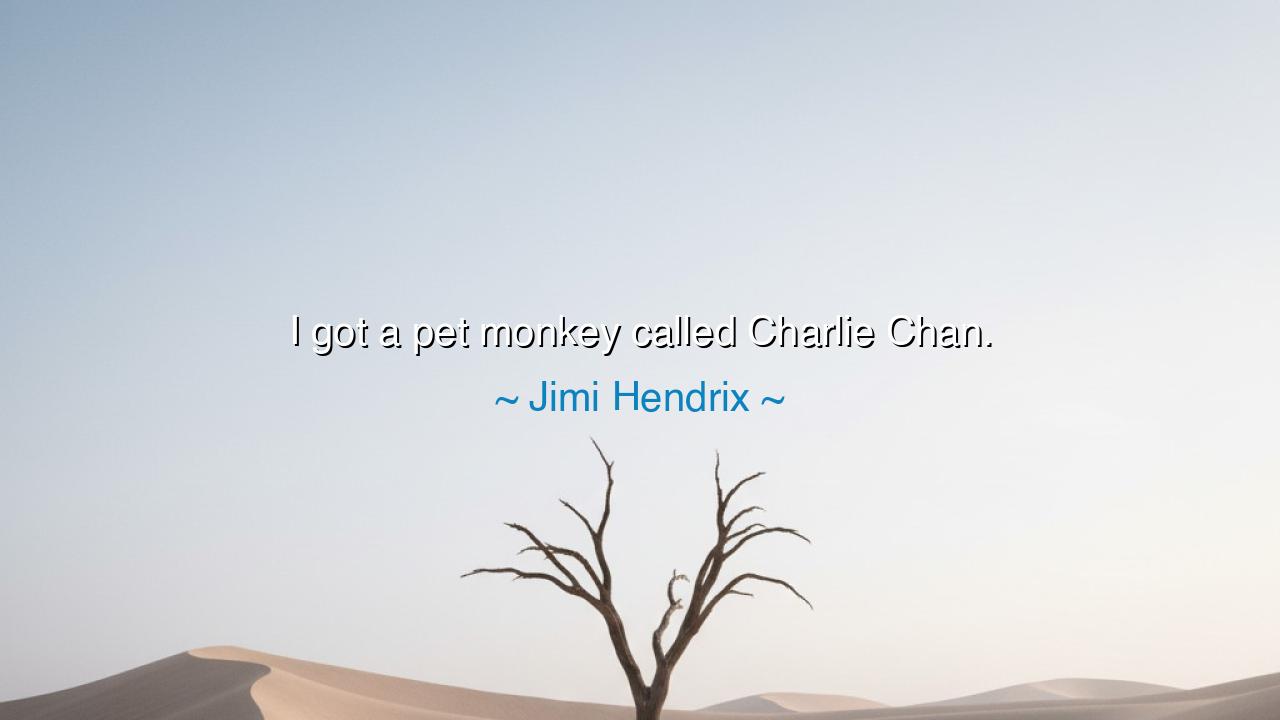
I got a pet monkey called Charlie Chan.






The great minstrel of the electric age, Jimi Hendrix, once proclaimed with his own wild humor and innocence: “I got a pet monkey called Charlie Chan.” At first hearing, the words sound playful, even strange—a glimpse into the eccentric mind of a man who lived outside the boundaries of ordinary thought. Yet when considered with the eyes of wisdom, this simple declaration becomes more than a quip. It speaks of freedom, of rebellion, of the refusal to live according to the dull rules of convention. For in the monkey, Hendrix found not merely an animal, but a symbol of mischief, creativity, and untamed spirit.
The pet monkey in his words reflects what is often hidden in the human heart: the desire for companionship that is wild, unrestrained, and alive with unpredictability. Where others might have chosen the faithful dog or the aloof cat, Hendrix chose a creature of chaos and laughter. To say he had a monkey is to say he embraced life’s surprises, its comic madness, and its refusal to stay tame. In this choice we glimpse the essence of his art: music that broke every rule, bending sound and soul into something the world had never heard before.
In naming the monkey Charlie Chan, Hendrix reveals another layer: the weaving of imagination with reality. Charlie Chan, a name tied to tales of mystery and cunning, becomes the mask worn by a creature of innocence. This blending of myth and play reflects Hendrix’s own artistry—he was never content to simply exist; he created symbols, characters, and universes out of the ordinary. The monkey was not only an animal; it was a companion in the great theater of his imagination.
History shows us parallels. The poet Lord Byron, centuries before Hendrix, famously kept a menagerie of animals, including a pet bear, while at Cambridge University. Where others obeyed the strict codes of academia, Byron brought wildness into the halls of learning, refusing to conform. His bear was not only a companion but a living declaration of independence from society’s narrow rules. Hendrix’s monkey stands in this same tradition—an emblem of rebellion, a statement that life must be lived on one’s own terms, no matter how strange it may appear to others.
The origin of Hendrix’s remark is not simply the ownership of an unusual animal, but his spirit of defiance against the ordinary. He lived in a world that often sought to confine him—through expectation, through industry, through fame. Yet by surrounding himself with symbols of freedom, whether through music or through pets, he declared that his life would not be tamed. To say “I got a pet monkey” is to say, I choose joy, I choose strangeness, I choose to live outside the lines drawn for me.
The lesson is clear: embrace the unusual, honor the wild within yourself. Do not seek always the comfort of convention, for in convention the spirit withers. Instead, allow yourself to live with unpredictability, to walk alongside companions—whether human or symbolic—that remind you to laugh, to play, to see life as more than labor and duty. For the soul requires not only discipline, but also delight; not only order, but also chaos.
Practical actions arise from this teaching. Surround yourself with symbols that remind you of freedom—objects, creatures, or practices that awaken joy. Do not be afraid of appearing strange in the eyes of others, for strangeness is often the face of truth. If you cannot own a monkey, then let your “monkey” be a passion, a hobby, a song, a reminder of the unpredictable and playful side of existence. Learn to nourish your creativity by stepping outside the ordinary, as Hendrix did, and you will find your spirit renewed.
Thus, the words of Jimi Hendrix—“I got a pet monkey called Charlie Chan”—endure not as a mere anecdote, but as a parable of rebellion and joy. They remind us that life, like music, must be improvised, that the strangest companions may teach us the greatest lessons, and that freedom often wears the mask of play. To future generations, let this wisdom be passed: keep a space in your life for laughter, for wildness, for the unexpected friend who reminds you that the spirit is meant to dance, not to crawl.






AAdministratorAdministrator
Welcome, honored guests. Please leave a comment, we will respond soon